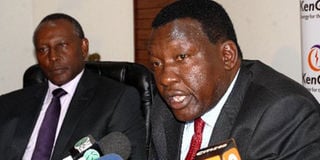Power connection fee goes up

The Cabinet Secretary Energy & Petroleum Davis Chirchir (right) and KENGEN Managing director Eddy Njoroge during a media briefing at KENGEN offices on May 27, 2013. PHOTO/SALATON NJAU
What you need to know:
- Kenya Power, however, insists that the previous charges are untenable.
Kenya Power Monday defied government directive freezing tariff review by announcing a new formula for charging customers seeking new connections.
In a statement sent to media houses, the firm said it would base the new rates on “economic cost of connecting” new users and not on the Sh35,000 flat fee that was until now applicable.
The company said this would apply until new rates were released after a study underway was concluded in “two to three months”.
“In the interim, customers who require power urgently prior to the Energy Regulatory Study being completed and new prices formulated are being quoted based on the economic cost of connecting them,” read the statement in which the company also defended itself against claims that it had put on hold applications for new users.
The tariff review comes despite a freeze order by Deputy President William Ruto earlier in the month and repeated yesterday by Cabinet Secretary for Energy and Petroleum Davis Chirchir.
Kenya Power, however, insists that the previous charges are untenable.
“The company is consulting with the government and Energy Regulatory Commission regarding new connections. This is because previous charges of Sh34,980 which were set in 2004 are not viable and the company cannot continue subsidising the cost,” read the statement.
According to Business Daily, many businesses were being kept on hold until a new directive on connections is issued from the head office in Nairobi.
Mr Chirchir hinted that the government might subsidise the charges for the connections, adding that the target was to have about 300,000 connections every year.
“Should we really be connecting that Kenyan who lives on $3 per day at Sh75,000?Yes, we should, if that is the cost, because Kenya Power is not in the business of subsidising. To what extent can we subsidise if there are no others (funders). So we are carrying out a study to confirm the costs,” he said.
Kenya Power has connected more consumers on its grid in the past 10 years than it did since independence due to subsidised rates.
After the study, applicants within a 600-metre radius of a transformer will pay a standard fee while those outside this range will be charged more depending on the number of additional poles.




